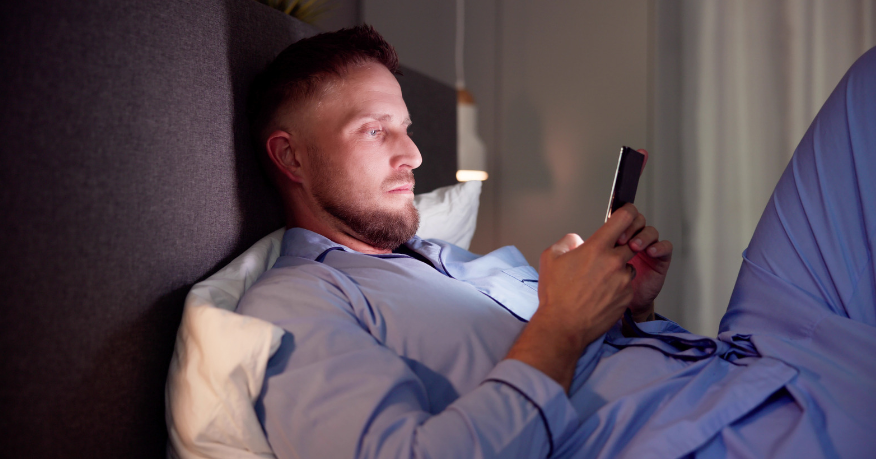Welcome to Heart to Heart with Honeydew! Today we discuss the dangers of blue light and how it impacts sleep. I give you a few tips, including one way to begin a better sleep routine.
Did you know that sight and sleep share a profound connection?
The eyes, specifically the retina, house specialized cells called intrinsically photosensitive retinal ganglion cells (ipRGCs) that play a pivotal role in regulating our circadian rhythms.
These cells are sensitive to blue light, the kind emitted by the sun, and many electronic devices. When exposed to blue light, especially during the evening, these cells send signals to the brain that can delay the release of the sleep hormone melatonin.
Basically, blue light at night = disrupted sleep!
What is it called when one half of your brain sleeps while the other half remains awake? (Scroll down for the answer)
This is a bundle consisting of 1 Scrumptious Side Pillow and 1 Scrumptious Pillowcase in Powdered Sugar (Made from 100% Organic Bamboo).
This is the perfect gift pack, a Scrumptious Side Pillow starter kit!
Sleep is the Ultimate Beauty Treatment
At night, our bodies repair and rebuild themselves, undergoing countless restorative processes like regulating our hormone production, creating new collagen, and healing our aching muscles.
As we age, however, our sleep quality declines, and with it so does our body’s ability to repair itself.
A Honeydew gift pack is the first line of defense against aging. Having proper alignment and support helps increase your sleep productivity, enhancing your body's natural healing processes. The cooling bamboo pillowcase reduces face and hair friction and maintains a comfortable sleeping temperature - all night long.
Since we're talking about the dangers of blue light before trying to sleep, here are a few things you can do to minimize blue light and potentially get better sleep:
1. Dim Electronic Screens: Reduce the brightness of your computer, smartphone, and tablet screens in the evening. Many devices also offer "night mode" settings that minimize blue light emission.
2. Wear Blue Light Blocking Glasses: These specially designed glasses filter out blue light, making evening screen time less disruptive to your sleep cycle.
3. Limit Screen Time: Aim to switch off all electronic devices at least an hour before bedtime. This gives your brain a break from blue light exposure, allowing it to prepare for rest.
4. Use Warm Lighting: Opt for warm-colored light bulbs in your living spaces during the evening. These emit less blue light compared to cool white or daylight bulbs.
As discussed, blue light exposure in the evening can suppress the body's production of melatonin, a hormone responsible for regulating sleep. By decreasing blue light exposure before bedtime, you support your body's natural sleep-wake cycle, making it easier to fall asleep and enjoy a more restful night.
One evening, after a particularly long day, I found myself nestled in bed, ready for some much-needed rest.
But instead of drifting off to sleep, I reached for my smartphone, intending to check a few notifications.
Before I knew it, I was scrolling through social media, reading articles, and watching videos. The soft glow of the screen illuminated my room, casting a blue hue that seemed almost hypnotic.
Hours slipped by, and by the time I looked up, it was well past midnight. The next morning, I woke up groggy, irritable, and regretting my late-night digital escapade...
Answer: This is known as unihemispheric sleep. Dolphins and some other marine animals exhibit this type of sleep because it allows them to continue surfacing for air and watching for predators even while sleeping.
Can you relate to this? Now, I should know better...we're a sleep company, after all! But even I fall into the trap of the screen, and it never helps my sleep. In fact, simply taking a break from your screen and opening up a paper book at night can do wonders for your sleep. Not only will it improve your sleep quality, but it also gives you a mental detox, prevents eye strain, and improves concentration and comprehension of what you read.
Whether you love nonfiction or romance novels, that paper book is the first step to a healthier sleep routine.
And what's the next step?
Make sure your head hits the most amazing pillow , covered by the softest pillowcase money can buy :)
So I challenge you today - pick up that paper book (if you're not already) and start creating a new sleep routine!








